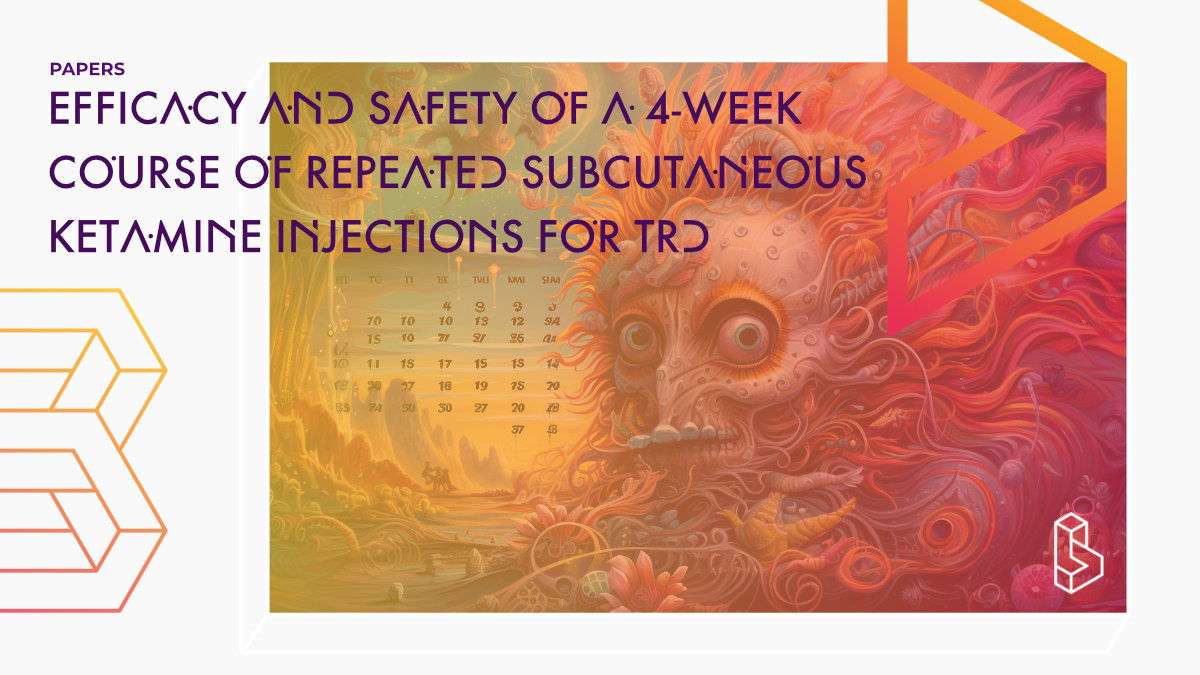This Phase III, double-blind, randomized trial (n=174) evaluated the acute efficacy and safety of a 4-week course of ketamine (35-63mg/70kg) in participants with treatment-resistant depression (TRD). The study found that ketamine was more efficacious than midazolam (1.75mg/70kg) in the flexible-dose cohort (remission rate 19.6% vs 2.0%), demonstrating that adequately dosed subcutaneous racemic ketamine is both effective and safe in treating TRD over 4 weeks.
Abstract of Efficacy and safety of a 4-week course of repeated subcutaneous ketamine injections for treatment-resistant depression (KADS study)
“Background: Prior trials suggest that intravenous racemic ketamine is a highly effective for treatment-resistant depression (TRD), but phase 3 trials of racemic ketamine are needed.
Aims: To assess the acute efficacy and safety of a 4-week course of subcutaneous racemic ketamine in participants with TRD. Trial registration: ACTRN12616001096448 at www.anzctr.org.au.
Method: This phase 3, double-blind, randomised, active-controlled multicentre trial was conducted at seven mood disorders centres in Australia and New Zealand. Participants received twice-weekly subcutaneous racemic ketamine or midazolam for 4 weeks. Initially, the trial tested fixed-dose ketamine 0.5 mg/kg versus midazolam 0.025 mg/kg (cohort 1). Dosing was revised, after a Data Safety Monitoring Board recommendation, to flexible-dose ketamine 0.5–0.9 mg/kg or midazolam 0.025–0.045 mg/kg, with response-guided dosing increments (cohort 2). The primary outcome was remission (Montgomery-Åsberg Rating Scale for Depression score ≤10) at the end of week 4.
Results: The final analysis (those who received at least one treatment) comprised 68 in cohort 1 (fixed-dose), 106 in cohort 2 (flexible-dose). Ketamine was more efficacious than midazolam in cohort 2 (remission rate 19.6% v. 2.0%; OR = 12.1, 95% CI 2.1–69.2, P = 0.005), but not different in cohort 1 (remission rate 6.3% v. 8.8%; OR = 1.3, 95% CI 0.2–8.2, P = 0.76). Ketamine was well tolerated. Acute adverse effects (psychotomimetic, blood pressure increases) resolved within 2 h.
Conclusions: Adequately dosed subcutaneous racemic ketamine was efficacious and safe in treating TRD over a 4-week treatment period. The subcutaneous route is practical and feasible.”
Authors: Colleen Loo, Nick Glozier, David Barton, Bernhard T. Baune, Natalie T. Mills, Paul Fitzgerald, Paul Glue, Shanthi Sarma, Veronica Galvez-Ortiz, Dusan Hadzi-Pavlovic, Angelo Alonzo, Vanessa Dong, Donel Martin, Stevan Nikolin, Philip B. Mitchell, Michael Berk, Gregory Carter, Maree Hackett, John Leyden, Sean Hood, Andrew A. Somogyi, Kyle Lapidus, Elizabeth Stratton, Kirsten Gainsford, Deepak Garg, Nicollette L. R. Thornton, Célia Fourrier, Karyn Richardson, Demi Rozakis, Anish Scaria, Cathrine Mihalopoulos, Mary Lou Chatterton, William M. McDonald, Philip Boyce, Paul E. Holtzheimer, F. Andrew Kozel, Patricio Riva-Posse & Anthony Rodgers
Summary of Efficacy and safety of a 4-week course of repeated subcutaneous ketamine injections for treatment-resistant depression (KADS study)
Ketamine is a novel, highly effective and rapidly acting treatment for treatment-resistant depression. Ketamine is used in antidepressant trials in two main ways: intravenous infusions of racemic (R,S)-ketamine and intranasal spray containing S-ketamine (Spravato). Few randomised controlled trials have examined the efficacy and safety of repeated doses of racemic ketamine compared with a placebo/drug control.
Racemic ketamine given by subcutaneous injection has shown efficacy in adults with TRD, but the optimal route of administration remains unclear. This trial examines the efficacy and safety of repeated racemic ketamine treatments over 4 weeks.
Method
Find this paper
https://doi.org/10.1192%2Fbjp.2023.79
Open Access | Google Scholar | Backup | 🕊
Cite this paper (APA)
Loo, C., Glozier, N., Barton, D., Baune, B. T., Mills, N. T., Fitzgerald, P., ... & Rodgers, A. (2023). Efficacy and safety of a 4-week course of repeated subcutaneous ketamine injections for treatment-resistant depression (KADS study): randomised double-blind active-controlled trial. The British Journal of Psychiatry, 1-9.
Study details
Compounds studied
Ketamine
Topics studied
Treatment-Resistant Depression
Depression
Study characteristics
Active Placebo
Double-Blind
Randomized
Participants
174
Humans
Compound Details
The psychedelics given at which dose and how many times
Ketamine 35 - 63mg | 2x
Linked Clinical Trial
Ketamine for Adult Depression Study (KADS)This interventional trial (n=200) aimed to assess the effectiveness of ketamine therapy among patients with treatment-resistant depression in a double-blind, randomised, controlled setting.

